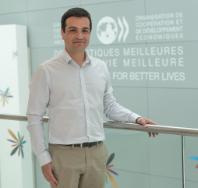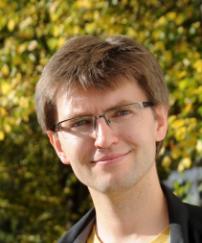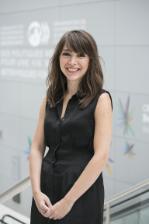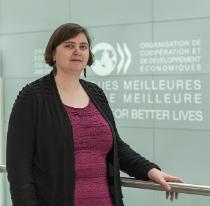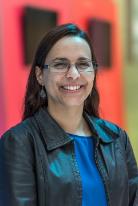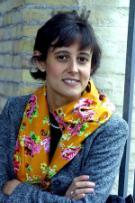Education
Thomas J. Alexander Fellowship - Fellows
Home |
How to Apply |
News |
Fellows |
To date, the Thomas J. Alexander Fellowship has granted over twenty awards to individuals producing policy relevant research in the area of equity in education and skills by exploiting the OECD knowledge base and data products.
Below you will find a full list of fellowship recipients. For further information such as contact details please contact edu.fellowships@oecd.org.
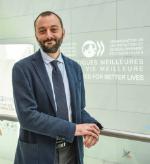
Tommaso Agasisti is an associate professor at Politecnico di Milano School of Management. His studies are in the field of Public Economics and Finance, Public Management and Policy, Public Administration, with particular reference to the educational sector. He is the co-director of three Executive Masters: Master SUM (Management of Universities), Master MES (Management of Schools), Master EMMPF (Management of Public Administrations), all three are programs taught in Italian. His research is published in several international peer-reviewed academic journals, in both fields of Economics and Education. He is member of Evaluation Commitees of several Italian public and private universities. In 2014, he was awarded a Thomas J. Alexander Fellowship at OECD, for studying the efficiency of schools using PISA data. For the period 2016-2018, he is responsible of the PoliMi unit in the H2020 Project called “Education Economics Network (EdEN)”, a joint project with KU Leuven, Maastricht University and Hungarian Academy of Science. He is an Associate Editor for the academic journal Higher Education Quarterly, and a member of the editorial board of other two international academic reviews, Educational Researcher and Tertiary Education and Management.
You can follow Tommaso on Twitter @Agasisti
Fellowship results:
The Efficiency of Secondary Schools in an International Perspective
Are Efficient Schools More Inclusive? OECD Education and Skills Today blog
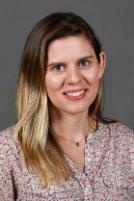
Sara Anderson is an Associate Professor at the West Virginia University in the college of Education and Human Services. In her work, she examines access to and barriers of professional development among the preschool workforce, by country and rural status. In 2018, she received a grant from the Spencer Foundation to study the educational policies that affect rural children and families.

João Galvão Bacchetto is a researcher in National Institute for Educational Studies and Research of Brazil (INEP), where he works as the National Project Manager of PISA. He is a Psychologist and had a master degree in Education by the University of São Paulo. He had worked as a consultant in a non-governmental organization to eradicate adult illiteracy, and did further studies in the area of educational assessment.
Fellowship project:
PISA offers a wealth of data about education in many countries. PISA 2012 allows for an in-deep analysis of each States. During the fellowship program I will prepare the PISA 2012 National Report for Brazil exploiting the different indexes produced by PISA to measure quality and equity of education across Brazilian States and to draw policy conclusions based on best practices in the Brazilian education.
Fellowship results:
Relatorio Nacional PISA 2012 (National Report for Brazil on PISA 2012)
Oportunidade de aprendizagem de conteúdo em matemática no PISA 2012
Jaime Balladares is a Psychologist and MA in Educational Psychology from Pontifical Catholic University of Chile. Currently, he is finishing his PhD studies at the Department of Psychology and Human Development, in UCL Institute of Education, London, UK. In the last years, Jaime have conducted a longitudinal study about reading predictors in a sample of children from low and high socioeconomic backgrounds at ages 5 and 7. His work focused primarily on early childhood and the effect of socioeconomic status on skill development in disadvantaged groups. In the past, the author participated in several projects related to learning processes, school management and creation of standards for school libraries, among others. Jaime has lectured courses in Psychology of Development and Psychology of Learning for students of pedagogy.
Fellowship resultst:
Academic achievement differences are strongly associated to the socioeconomic environment where a child develops. These inequities start in early years and tend to be wider in primary and secondary education. Developing policies in the early years to reduce the gaps between children from different socioeconomic backgrounds is becoming increasingly urgent.
The impact of early child education on later academic achievement has been widely proved. Children that regularly attend preschool show better cognitive, social, language and literacy skills than their peers who have not. In turn, children from low socioeconomic backgrounds rarely attend preschool in comparison to their peers from high socioeconomic backgrounds. This is due to several reasons, such as mistrust or lack of money, among others. Thus, evaluating the specific impact of pre-school education on children from low socioeconomic status in countries with unequal income is becoming an important topic for the governments.
This study aims to analyse several preschool-related features on PISA results, using nested analysis in which country and school features and family socioeconomic backgrounds are considered. The focus will be based on those students from low socioeconomic backgrounds, to find preschool-related factors that can mitigate the effect of deprived backgrounds on later academic achievement.
The results of the study aim to contribute in designing better educational policies in early childhood, particularly in those countries with a high proportion of students from low socioeconomic backgrounds or highly segregated.
Fabian Barrera Pedemonte is a researcher and seminar tutor in quantitative methods at the UCL Institute of Education (IOE, London), and a research fellow of the College for Interdisciplinary Educational Research in Germany. He recently received his PhD in Education from the Department of Quantitative Social Science of the IOE, sponsored by the National Commission for Scientific and Technological Research of Chile. His doctoral project compared the contribution of high-quality teachers’ professional development to school outcomes in the US, England, Japan and Finland, as measured in a number of international large-scale studies, such as the 2012 Programme for International Student Assessment (PISA), the 2011 Trends in International Mathematics and Science Study (TIMSS), and the 2013 Teaching and Learning International Survey (TALIS). Fabián co-authored the TALIS 2013 national report for England, and worked as a data analyst on a range of projects related to induction programmes and teachers’ social networks at the London Centre for Leadership in Learning (IOE). Previously, he was a research coordinator at the Integra Foundation, one of the main providers of early childhood education in Chile, where he developed standardised assessments of learning achievement for this level, as well as national evaluations of curriculum reforms and educational programmes. Before, he had studied at the University of Chile (BA, Psychology) and the Pontifical Catholic University of Chile (MA, Educational Psychology), where he also worked as a teaching assistant for various courses in educational psychology. His research interests include the way the experiences of teacher learning and development affects student learning, the educational policies on teacher preparation, and cross-national quantitative comparisons for evidence-informed school system reform.
Fellowship results:
Nicholas Biddle is Associate Director of the Australia National University Centre for Social Research and Methods, as well as Director of the Policy Experiments Lab. He has a Bachelor of Economics from the University of Sydney and a Master of Education from Monash University. He also has a PhD in Public Policy from the ANU where he wrote his thesis on the benefits of and participation in education of Indigenous Australians.
Fellowship results:
As part of the work of the Education Policy Outlook on responsiveness and resilience in education policy, Dr. Biddle explored how policy makers can help students to make better decisions in the context of the COVID-19 pandemic, natural disasters, economic crises, or other types of change, particularly examining the biases that influence decision making in students.
You can read read his paper ''Behavioural economics and the COVID-induced education crisis'' here and a blog on the working paper here.
Przemysław Biecek, is a data scientist with background in mathematical statistics. He works at University of Warsaw, Poland. Main research interests cover semi supervised data modelling, data visualisation, data engineering and R GNU software.
During his Thomas Alexander Fellowship he was working with Francesca Borgonovi PhD. Main results of this project are related to (1) the relation between the occupation of parents and pupils performance measured with PISA 2012 (see for example http://bit.ly/1W2TTKf) and (2) pupils endurance - ability of keeping high performance along test progression. Side products of the fellowship are R packages that facilitate work with PISA and PIAAC datasets (see https://github.com/pbiecek/PISA2012lite or https://github.com/pbiecek/PIAAC).
He is an author or co-author of over 40 scientific publications mostly in bio-med statistic. Published three monographs about Programming with R, Regression modelling with fixed and random effects, Essays about data Visualisations.
Recently he started a project ,,Beta and Bit’’ (http://betabit.wiki): set of statistical puzzles, stories and games for teaching data literacy and data programming in primary and secondary schools.
To find out more please visit Przemyslaw Biecek's website.
Fellowship results:
Özge Bilgili is an assistant professor Utrecht University School of Social Affairs. Her expertise is on immigration integration, transnationalism and education research and policy analysis in relevant areas. She is the chair of the Dutch Association for Migration Research (DAMR), the co-coorginator of the IMISCOE Standing Committee on Interactions of Migrant Integration and Transnationalism in Europe (IMITE) and an affiliated researcher of the United Nations University MERIT.
During her fellowship, Dr. Bilgili's research used the PISA 2015 database and cross-classified multi-level analysis to compare first and second generation immigrant students with their non-immigrant peers. The core analystical aspect of her research focused on migration related factors (age at migration, host country and heritage language), schooling experiences, language and teaching support use while controlling for background characteristics and embedding students in schools and their origin and destination countries. The second part of her research builds upon the challenges with regards to immigrant students' integration where Dr. Bilgili conducted an in-depth analysis of current targeted policies and programs at local and national levels in destination countries with increased first and or second generation immigrants, diverse migration histories and policy approaches. Dr. Bilgili discusses the most effective ways in which education systems can support the multi-dimensional integration of students with a migration background. Through her OECD working paper, Dr. Bilgili lays out a framework for evaluating policies that promote immigrant student resilience.
Fellowship results:
Ellen Boeren is Chancellor’s Fellow at the Moray House School of Education at the University of Edinburgh, UK. She actively researches participation in adult lifelong learning activities, has completed a PhD at the Catholic University Leuven, Belgium, and recently finished her first monograph ‘Lifelong learning participation in a changing policy context: an interdisciplinary theory’, published by Palgrave-Macmillan. From October 2016 onwards, she will lead the Edinburgh team in the 2.5 million euro Horizon2020 project ENLIVEN - Encouraging Lifelong Learning for an Inclusive and Vibrant Europe.
She is the Programme Director of Edinburgh’s MSc in Educational Research, teaches Comparative Analysis in Education within this MSc programme and is Chair of the Standing Conference on University Teaching and Research in the Education of Adults (SCUTREA).
Fellowship results:
Exploredimmigrants’ lifelong learning participation patterns in a wide range of OECD countries, based on data from PIAAC’s (Programme for the International Assessment of Adults Competencies) Survey of Adult Skills. Using these data, she provides an answer to the question whether differences in participation patterns in lifelong learning relate (a) to different lifelong learning and social policy structures in countries or (b) to differences in the type of immigrants countries attract, leading to different lifelong learning needs. This is done through comparison of profiles of immigrant lifelong learners, not only including their socio-economic and socio-demographic characteristics and skills levels, but also through exploration of the characteristics of the lifelong learning activities they participate in.
Findings can inform educationalists and sociologists on the increased theoretical knowledge base on integration of immigrants in the OECD’s lifelong learning systems. The major aim is to help policy makers to tackle the persistent inequalities in many lifelong learning systems, affecting immigrants’ participation in the labour market and society in general.
You can follow Ellen on Twitter @ellen_boeren.
Alex J. Bowers is an Associate Professor of Education Leadership at Teachers College, Columbia University. His research focuses on the intersection of effective school and district leadership, organization and HR, data driven decision-making, student grades and test scores, student persistence and dropouts. His work also considers the influence of school finance, facilities, and technology on student achievement. Dr. Bowers has more than ten years of experience in conducting research on education and has published over fifty research works and three books. He holds a PhD in K-12 Educational Adminstration from Michigan State University, and previous to education research, worked for a decade in the biotechnology industry with a bachelor’s in Biochemistry from Michigan State University and a master’s degree in Molecular Biology, Biochemistry & Microbiology.
Fellowship results:
During the fellowship project, Dr. Bowers worked with data from TALIS 2018 to consider the extent to which a congruency-typology model of leadership for learning is distributed across countries, identifying potentially different typologies of teachers, principals, and schools who may align or be mis-aligned in their shared perceptions of the extent of leadership for learning in their school.
To find out more about Dr. Bowers’ work, please refer to his faculty website: https://www.tc.columbia.edu/faculty/ab3764/
Social media: https://twitter.com/Alex_J_Bowers

Henry Braun holds a Ph.D. in mathematical statistics from Stanford University. After serving as an assistant professor of statistics at Princeton University, he joined the Educational Testing Service in 1979, where he served as the director of statistical and psychometric research from 1982 to 1990, and vice-president for research management from 1990 to 1999. He held the title of distinguished presidential appointee from 1999 to 2006. In 2007, he retired from ETS and assumed the position of Boisi Professor of Education and Public Policy in the Lynch School of Education at Boston College. He is a fellow of the American Statistical Association and of American Educational Research Association (AERA). He is a co-recipient of the 1986 Palmer O. Johnson Award of the AERA and a co-recipient of the National Council for Measurement in Education’s 1999 Award for Outstanding Technical Contribution to the Field of Educational Measurement. He has presented keynote addresses at many conferences around the world, and serves on a number of state and national advisory committees on testing. Braun’s interests include school and teacher accountability, the role of testing in education policy, and statistical methodology. In recent years, he has published on a variety of topics including the black-white achievement gap, comparative school effectiveness, applications of multi-level modelling, and the role of literacy in economic and social welfare. His current work includes policy-related data analysis of large-scale assessment surveys, like the OECD Programme for the International Assessment of Adult Competencies (PIAAC), investigation of the dynamics underlying income inequality and stagnant inter-generation mobility in the United States, and methods for evaluating the relative effectiveness of teacher preparation programmes.
Henry can be reached by e-mail henry.braun@bc.edu
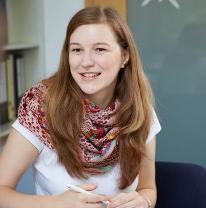
Janine Buchholz is a post-doctoral researcher at the Leibniz Institute for Research and Information in Education (DIPF) in Frankfurt (Germany). With a background in educational measurement, her research focuses on both measurement invariance and engagement, particularly in the context of self-report questionnaires in international large-scale assessments. She holds a PhD in Psychology from the University of Frankfurt and has served as a research scientist for the OECD’s PISA since 2015 where she was in charge of scaling the international questionnaire data.
Fellowship results:
Mixed-worded scales and acquiescence in educational large-scale assessments (OECD Working Paper)
Janine’s fellowship project is about acquiescence, i.e., the tendency to agree with questionnaire items regardless their content. If being systematically related to person or country characteristics, as prior research suggests, such a response style holds the potential to threaten valid comparisons between groups of respondents or countries. She therefore examined the questionnaires from the OECD’s recent educational large-scale assessments across multiple study programmes (PISA, TALIS, SSES, IELS, PIAAC) for mixed-worded scales to construct a simple index of acquiescence. She then examined its prevalence within and between countries, its correlates, its impact on associations between indicators, as well as its county-level consistency across one decade. The analyses are documented in this OECD working paper.
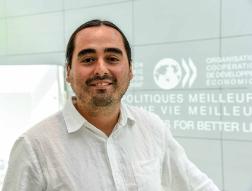
Daniel Caro is a Research Fellow at the Oxford University Centre for Educational Assessment. He completed a PhD in Education at the Freie Universität Berlin, a Master’s degree in Interdisciplinary Studies at the University of New Brunswick, and a BA in Economics at Universidad del Pacifico. Daniel is alumnus of the OECD’s TJA Fellowship Programme and alumnus of the International Max Planck Research School on the Life Course. His research interests include education inequality, educational effectiveness, international large-scale assessments, and advanced quantitative methods. He has lectured extensively at the University of Oxford and pre-workshop conferences on multilevel modelling, the R programming language, structural equation modelling, and causal inference techniques. During his TJA Fellowship, Daniel studied education system effectiveness and teaching effectiveness with data from PISA. Jointly with TJA Fellow Przemysław Biecek, Daniel has developed the R package 'intsvy' for the analysis of international assessment data (e.g., PISA, PIAAC, TIMSS, PIRLS).
You can follow Daniel on Twitter @daniel_h_caro.
Fellowship results:
Which countries punch above their weight in education rankings? The Conversation
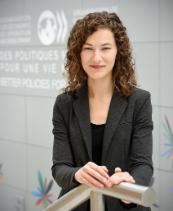
Anna Katyn Chmielewski is an Assistant Professor of Educational Leadership and Policy in the Ontario Institute for Studies in Education (OISE) at the University of Toronto. She holds a PhD in Education and MA in Sociology from Stanford University. Chmielewski’s research examines macro-level trends in educational inequality, both cross-nationally and over time. Specifically, she is interested in socioeconomic disparities in academic achievement, school segregation, curricular tracking/ability grouping and university access, as well as the consequences of childhood inequality for adult skills, educational attainment and income. Her research has been published in the American Educational Research Journal and the American Journal of Education. Chmielewski was a postdoctoral fellow in the Pathways to Adulthood program at Michigan State University and a visiting scholar at the Centre for Educational Science and Psychology at the University of Tuebingen, Germany.
For more information about Katyn's work you can visit her website.

Álvaro Choi is an associate professor in the Department of Economics at the University of Barcelona, from which he holds a PhD in Economics. He has worked extensively with international educational assessments, published several publications in international journals and participated in the evaluation of a number of educational policies. He has been visiting research associate at the UCL-Institute of Education and Thomas J. Alexander fellow at the OECD. His main research interests are in the Economics of Education and the evaluation of public policies.
Choi’s research aims at better understand the evolution of the gender gap in proficiency along the lifecycle. Combining data from PIRLS/TIMMS, PISA and PIAAC, makes it possible to follow representative samples of the same birth cohorts over time, thus partly overcoming one of the biggest limitations of International Assessment Surveys, i.e. their cross-sectional nature. This research has the potential to shed light on an important policy issue. A better understanding of gender differences in the process of skills formation, as well as the identification of possible cross-country differences in how the gender gap evolves as people age, is crucial in helping the design of policies able to tackle in effective ways current gender disparities in educational and labour market outcomes.
The project focuses on gender inequalities in the process of skills acquisition. It aims to measure the size of the gender gap in the acquisition of key skills over time and to understand its evolution from a comparative perspective. While the existence of gender gaps in the acquisition of different skills (mathematics, reading, etc.) is a well-known fact, much less is known about the evolution of this gap over time.
Álvaro can be reached by e-mail alvarochoi@ub.edu.
North Cooc is an Assistant Professor in the Department of Special Education at the University of Texas at Austin. His research focuses on addressing inequality in the experiences and outcomes of children with disabilities, particularily those from racial and ethnic minority backgrounds. He recently completed projects examining racial bias in how teachers identify students with disabilities and how parents use community services to access information related to special education. His current work explores the training and qualifications of special education teachers. He received his doctorate in quantitative policy analysis in education and a master's in international education policy from the Harvard Graduate School of Education.
Dr. Cooc's fellowship project uses data from the Teaching and Learning International Survey (TALIS) to assess and compare the degree to which teachers in OECD and partnering countries are prepared to teach students with disabilities and to determine what teacher and school-level contextual factors may predict differences in teacher preparation. TALIS is one of the only international surveys with a focus on the work conditions of teachers. TALIS is ideal for Dr. Cooc's research aims due to the scope and size of the teacher sample, the availability of detailed measures of teacher preparation, and information on school contexts.
Findings from this study contribute to new knowledge on the preparation of teachers who work with children with special needs around the world. In doing so, the study addresses whether countries are making progress in providing a quality education to a group often marginalized in society. The study also helps to shift the international conversation on access to schooling for children with special needs to the issue of quality and support for the teachers most integral to their education.
Denise Costa is a Researcher at Instituto Nacional de Estudos e Pesquisas Educacionais Anisio Teixeira (INEP), Brazil. She holds a PhD in Statistics and was responsible for planning, supervising, coordinating and developing studies for evaluating large-scale Brazilian government educational assessments such as Enem (National Examination of Secondary Education) and SAEB (System of Evaluation of Basic Education).
Her fellowship project aimed to produce a series of studies about Brazilian students' performance in PISA 2015, collected in the national report for Brazil. In the first part of her work, Denise described the entire PISA sampling procedures for Brazil, indicating the limits of analysis particularily at a state-level. Working on item difficulties by classical analysis, she was able to identify strengths and weaknesses of the Brazilian youth in the assessment. She used PISA scales to compare the scores of Brazilian students from both national and international points of view. Some OECD indices were also used to contextualise the data, exploring students' perceptions and motivations to learn, as well as describing their school atmosphere and the equity in the 27 Brazilian states. Her last study was related to a comparison of PISA and SAEB, focusing on the differenes and similarities between these two important large-scale educational assessments in Brazil.
Fellowship results:
PISA 2015 National Report for Brazil - Full report
PISA 2015 National Report for Brazil - Summary in Portuguese
PISA 2015 National Report for Brazil - Summary in English
PISA 2015 National Report for Brazil - Compendia
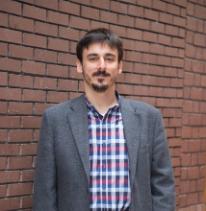
Alper Dinçer is the Principal Inclusion Economist at European Bank for Reconstruction and Development (EBRD) - European Bank for Reconstruction and Development (EBRD). Previously Alper was a research coordinator of Education Reform Initiative at Sabancı University in Istanbul, Turkey. He is an education economist and holds a PhD. in Economics and Education from Teachers College, Columbia University. Since 2008 he has been conducting policy-oriented academic research with quantitative research methods and large-scale surveys. Dinçer's articles have published in World Development and International Journal of Educational Development. Dinçer's research is at the intersections of economics of education and development. His research aims to contribute to a deeper understanding of the interplay between skills/learning/education, education-related decision making and its impact on human development. More precisely, he focuses on empirical evaluations of education policy interventions as well as intended and unintended consequences of these policies on human development. By primarily relying on quasi-experimental design, Dinçer's objective is to produce reliable and robust insights to inform theory and policy-level decision makers.
You can follow Alper on Twitter @MAlperDincer
Gianni Fregonara is a journalist who writes about education for Italy’s main daily "Corriere della Sera". After getting a degree in law and a master in journalism she became a political correspondent for Corriere. In 2013 leaving the lead of the desk in the Roman offices of the newspaper she created the new education desk at Corriere della Sera with a dedicated online page and a regular coverage of the most important news and issues on schools, universities and research in Italy and abroad. The aim of this desk is not only to inform but to raise awareness in the public on the new challenges faced by the school systems, using data and research to present issues and articles.
She is co-author of the following publications: "Onorevole parli chiaro" (Rcs); ”Dieci giorni: dalle dimissioni di Berlusconi al governo Monti, cronaca, analisi segreti”, Corriere della Sera,”I voti all’Università, la valutazione della qualità della ricerca in Italia”, Corriere della Sera. Author: “Spassionati, i cittadini di domani e la democrazia che verrà”, University Press Italiane; "Il potere del pifferaio magico: dalle fake news al populismo digitale, la risposta della scienza", University Press Italiane

Samuel Greiff is research group leader, principal investigator, and ATTRACT-fellow at University of Luxembourg. He holds a PhD in cognitive and experimental psychology from the University of Heidelberg, Germany (passed with distinction).
Prof Greiff has been awarded several national and international research funds by diverse funding organizations such as the German Ministry of Education and Research and the European Union (overall funding approx. 6.0 M €), is currently fellow in the Luxembourg research programme of excellency, and has published articles in national and international scientific journals and books (>60 contributions in peer-reviewed journals; many of them leading in their field). He has an extensive record of conference contributions and invited talks (>200 talks) and serves as editor for several journals, for instance as editor-in-chief for European Journal of Psychological Assessment and guest editor for Journal of Educational Psychology and Thinking Skills and Creativity. He has a regular record of ad-hoc reviewing for around 40 different journals and currently serves on five editorial boards.
He has been and continues to be involved in the 2012, 2015, and 2018 cycle of the Programme for International Student Assessment (PISA), for instance as external advisor to the PISA 2012 and 2015 Expert and Subject Matter Expert Groups and as contracting partner at his institution. He serves also as chair of the problem solving expert group for the second cycle of the Programme for the International Assessment of Adult Competencies (PIAAC). In these positions, he has considerably shaped the understanding of problem solving in several large-scale assessments.
He has been working for several years on the assessment of transversal skills such as complex and collaborative problem solving and their role in the classroom, at work, and in private life. Currently, he is involved in the large-scale assessment of problem solving, collaboration, and life-long learning in various populations and leads a team of test developers, research assistants and graduate students totalling in a team of 4 Postdocs and 8 PhD students dedicated at increasing the understanding, the measurement, and the application of different aspects of transversal skills and lifelong learning in educational contexts.
Samuel can be reached by e-mail samuel.greiff@uni.lu. For more information on Samuel's research group on computer-based assessment please visit the group's website or Facebook page.
Fellowship results:
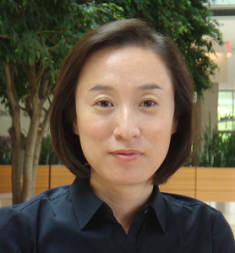
Seong Won Han (Ph.D. in Sociology, University of Wisconsin-Madison) is an Assistant Professor of Educational Leadership and Policy at University at Buffalo, The State University of New York. Her research interests include international and comparative education, gender inequalities in science, technology, engineering, and mathematics (STEM), educational policy, and teacher quality. Using large-scale international surveys and student achievement data, her current project focuses on cross-national differences in students’ expectations for STEM careers. Her research has been supported by a dissertation grant from the American Educational Research Association (AERA). She also investigates the factors that help to improve instruction and student outcomes in urban public schools in the United States, with a focus on how comprehensive school reform can support instructional change among teachers, and how education leaders can support teachers’ improvement efforts. Her research has been published in the Review of Higher Education, Teachers College Record, and as part of an edited collection on leadership and instructional change. Find out more about Seong Won’s work here.
Seong Won can be reached by e-mail seongwon@buffalo.edu.
Fellowship results:
Who wants to become a teacher? OECD PISA in Focus
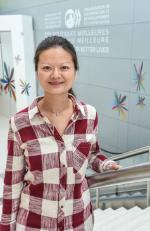
Jia He is a Humboldt post-doctoral researcher in the German Institute for International Educational Research (DIPF) in Germany. She obtained her Ph.D. (cum laude) in cross-cultural psychology in Tilburg University, the Netherlands. She obtained her M.A. degree in Intercultural Communication from Shanghai International Studies University, China. She is a Thomas J. Alexander fellow and she worked with the Teaching and Learning International Survey in OECD in 2015. Her fellowship project involves the extent of data incomparability in international surveys such as TALIS and PISA, and on solutions to overcome or pre-empt the effects of data incomparability. Her current research includes comparability and validity with innovative designs of item formats and sophisticated psychometric methods in cross-cultural research. She is also interested in modern research methods such as structural equation modeling, multilevel analysis, and Bayesian statistics.
Fellowship results:
Report on Social Desirability, Midpoint and Extreme Responding in TALIS 2013 - OECD Working Paper
Quiwei He is a Research Scientist for the Center for Global Assessment at Educational Testing Service (ETS), where she helps oversee projects in international large-scale assessments. Her work has developed scientific principles to better understand innovative item types such as the interactive scenario-based and collaborative problem solving items used in PISA and PIAAC. Recently, together with Columbia University colleagues, she won a four-year grant from the National Science Foundation. She will be the principal investigator in developing latent and graphical models for complex dependent data in education. She received her Ph.D. in Psychometrics and Data Analysis from the University of Twente, Netherlands, in 2013. Her dissertation on “Text Mining and IRT for Psychiatric and Psychological Assessment” won the 2013 Abbas Dissertation Award from Netherlands and the 2017 Anne Anastasi Dissertation Award from American Psychological Association, Division 5 (Quantitative and Qualitative Methods). The innovative nature of her research has received other recognition, including the 2017 Alicia Cascallar NCME (National Council of Measurement in Education) Award for an Outstanding Paper by an Early Career Scholar.
Fellowship results:
Adult assessments have evolved to keep pace with the changing nature of adult literacy and learning demands. With the growing importance of information and communication technologies (ICT), measures of ICT literacy skills, digital reading, and problem solving in technology-rich environments (PSTRE) are increasingly important topics for exploration through computer-based assessment.
The use of computers as the delivery platform enables data collection not just on whether respondents are able to solve the tasks but how they approach the solution and how much time their efforts take. This additional information helps us understand the strategies that underlie proficient performance. By analysing the process data produced by adults in different performance groups and countries, we are able to obtain insights into how these sequences of actions are associated with different ways of cognitive processing and to identify key actions that lead to success or failure.
This project will use process data collected in log files from PIAAC as well as existing data from the assessment to identify predictors from background variables as along with key features generated from the process data. This project aims at (1) exploring a solution to generalize the action patterns across multiple items rather than relying on individual features specific to a particular task, (2) extracting sequence patterns (i.e., mini-sequences) from process data with data mining techniques, and (3) adding background variables as additional features in identifying malleable factors associated with adults’ digital literacy and problem-solving proficiency.
This project will not only yield advances in methodology for others to use in the future but also help discover insights into the strategies differentiating between high and low proficiency in adults’ performance in PSTRE and digital literacy. This will be of importance for policymakers from different countries to better understand the strategies that adults use to solve digital problems, hence finding better solutions to support adults’ training in order to enhance their problem-solving skills.

John Jerrim's research interests include the economics of education , access to higher education, intergenerational mobility, cross-national comparisons and educational inequalities. He has worked extensively with the OECD Programme for International Student Assessment (PISA) data, with this research reported widely in the British media. In October 2011 he was awarded a prestigious ESRC post-doctoral fellowship to continue his research into the educational and labour market expectations of adolescents and young adults. Since then he has won the inaugural ESRC Early Career Outstanding Impact award and received an ESRC grant to study cross-national comparisons of educational attainment and social mobility.
For more information on John's work, please visit his personal website.
Fellowship results:
Income Inequality, Intergenerational Mobility and the Great Gatsby Curve: Is Education the Key?
Emigrants from Great Britain: what do we know about their lives?
Britain's brightest leaving in brain drain and replaced with low skilled migrants - The Telegraph 26 Feb 2015
Not adding up - The Economist 26 Feb. 2015
Jihyun Lee is a Professor of Educational Assessment at the School of Education, University of New South Wales (UNSW), Sydney, Australia. She holds a Ph.D. in Educational Measurement and Applied Statistics from Teachers’ College, Columbia University in New York and a Master of Education in Human Development from the Harvard Graduate School of Education. She was a post-doctoral fellow at the Educational Testing Service (ETS), Princeton, New Jersey. She also worked as a Visiting scholar at The IEA (International Association for the Evaluation of Educational Achievement) Data Processing and Research Center (DPC) in Hamburg, Germany; at the Collingwood College, Durham University, United Kingdom; and at the School of Education in the Seoul National University (SNU), Seoul, Korea.
Her research is at the intersection between educational psychology, cross-cultural psychology, comparative education, measurement, assessment, survey design, and quantitative research methodology. Her main research interest is identification of predictors of academic achievement, using large-scale international assessment datasets, which include socio-economic status (SES), self-beliefs, confidence, and academic interest.
Fellowship results:

Barbara LeRoy is an Associate Professor (Research) and the immediate past Director of Michigan's University Center of Excellence on Developmental Disabilities (DDI) and a member of the graduate faculty in Education at Wayne State University, Detroit, Michigan (USA). She is a member of the Governor's Council on Developmental Disabilities and an advisor on several Michigan disability task forces and boards. Internationally, Dr. LeRoy is on the Board of the United States International Council on Disabilities and is Vice Chair of the Education Commission for Rehabilitation International (RI), as well as an Advisor to UNICEF's State of the World's Children with disabilities. In her more than 40 years of experience in disability policy and program development, she has implemented systems change projects in supported employment, inclusive education, aging, and self-determination models for community support. Currently, she is serving as project Principal Investigator for Michigan's National Core Indicators program and Michigan's HCBS compliance transition program. Dr. LeRoy has consulted on disability systems change with NGOs and governmental entities in New Zealand, Australia, Malaysia, Japan, Hong Kong, Europe, and the United Arab Emirates. She was a policy and special needs research consultant to OECD, Paris and the European Commission Joint Research Centre, Milan. She is the co-author of Women with Disabilities Aging Well, as well as numerous book chapters and journal articles on education, mothering, and disability disparities.
Barbara can be reached by e-mail B_Le_Roy@wayne.edu.
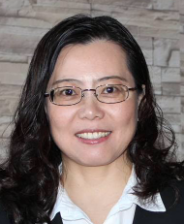
Haiying Li is a Senior Research Analyst at Iowa State University, where she applied learning analytics and a mixed methods approach to inform policies related to recruitment, enrollment, financial aids, and student success. She completed a Ph.D. in Cognitive Psychology with a specialty in Learning Technology from the University of Memphis. Her primary research interests are the design of conversational/pedagogical agents in intelligent tutoring systems and educational games to enhance learning and assessment in literacy, science, and collaborative problem solving. To implement adaptive learning, she has developed automated grading algorithms using natural language processing and machine learning techniques as well as applied learning analytics to identify learners’ struggles and difficulties during their learning processes.
Fellowship results:
Haiying concentrates on equity in science assessment, particularly in the interactive, simulated PISA science assessment, from the perspectives of assessment formats and reading and writing proficiencies.

Huacong Liu received her doctorate in higher education with a focus on economics of education from the Pennsylvania State University Department of Education Policy Studies in August 2017. She researches the economics of higher education and related issues. Her current work involves topics such as educational mismatch, with a cross-country perspective; race-conscious admissions policies in the United States and student body diversity; and skill formation across education systems, with a focus on the contrast between the United States and Germany. She sees these topics as tackling different aspects of educational inequality.
Huacong’s research project seeked to evaluate whether different countries’ educational systems are effective in supplying national labour markets with graduates who have sufficient numeracy and literacy skills, as well as the capacity to manage information and solve problems in a technologically advanced environment. In particular, the project examined the ways in which national educational systems track students and balance instruction between general and specific skills. These topics are gaining increased attention from policymakers, economists, sociologists, and educational researchers in an increasingly global and competitive economy (OECD, 2016).
Using data from the Programme for the International Assessment of Adult Competencies (PIAAC), Huacong’s study used OLS regression with country fixed effects to examine and compare how effective different education systems are in improving individuals’ general skills across OECD countries. Understanding these relationships is highly relevant and timely at a time when countries such as Germany faces push for standard national curricula and a move toward a less segregated system to replace the traditional strict tracking and vocationally-oriented system. In contrast to Germany, the public in the U.S. is looking to orient education in more practical directions. In initiating any education reform, policymakers need a better understanding of how education system characteristics such as early tracking and vocational orientation of curriculum influence individuals’ accumulation of general skills. The results of this study will provide quantitative evidence to inform policy debates.
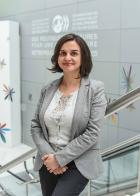
Gabriela Miranda Moriconi is a researcher at Carlos Chagas Foundation, a non-profit research institute in São Paulo, Brazil. She has a doctoral degree on Public Administration and Government from the São Paulo Business Administration School of
Getulio Vargas Foundation (FGV-EAESP). Previously, she worked at the Department for Educational Studies at the National Institute for Educational Studies and Research Anísio Teixeira (INEP), the organization responsible for Brazilian educational statistics and assessment. Her research interests lie in the area of education systems and policymaking, and in the area of teacher policies, including themes like wages, career, working conditions, initial education and professional development. She was awarded with a Thomas J. Alexander Fellowship from September 2013 to September 2014. Her research as a TJA fellow aimed to provide inputs to policymakers and school leaders, especially in Latin America, to support teachers and schools with student behaviour issues and improve classroom and school climate. The research was composed by an in-depth analyses of TALIS 2013 data from Brazil, Chile and Mexico (the three Latin American countries participating in the survey) and case studies of the educational systems of England and the Canadian province of Ontario.
Fellowship results:
Improving School Climate and Opportunities to Learn (OECD Education and Skills Blog)
Improving School Climate and Opportunities to Learn (OECD Teaching In Focus)
Student Behaviour and Use of Class Time in Brazil, Chile and Mexico - Evidence from TALIS 2013
Results from TALIS 2013 - Brazil - Country note
Ragnar Ólafsson hold a BA-degree in French (major) with Philosophy from the University of Iceland, which he received in 1982. In 1988, he graduated from the University of Iceland after Psychology. In addition, Ragnar holds an M.Sc. in Social Psychology from London School of Economics and an M.Sc. in Experimental Research Methods in Psychology from University College.
Fellowship results:
Ragnar went on to work within the OECD's Directorate of Education as a researcher and as National Project Manager for TALIS (Teaching and Learning International Survey), contributing to the 2018 Starting Strong Survey. Ragnar also contributed to the article Budgeting in Montenegro.
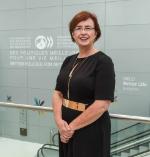
V. Darleen Opfer has served as Director of RAND Education since 2011; she also holds the Distinguished Chair in Education Policy. From 2005 to 2011, she was director of research and senior lecturer in research methods and school improvement at the University of Cambridge’s (England) Faculty of Education.
Her research work utilizes large-scale surveys and other methods to understand the conditions that impact outcomes for teachers and students. She currently leads the TALIS Video Study funded by the OECD; a study using video observation, surveys, and student achievement tests to explore the association between teaching practices and student outcomes in nine countries. She also co-leads with Brian Stecher, RAND’s American Teacher Panel and American School Leader Panel which are two nationally representative longitudinal panels of teachers and school leaders in the United States who are available to respond to surveys three to four times per year throughout their careers to track impacts of education policies.
In 2014, she was selected as a Thomas J. Alexander Fellow by the OECD where she used TALIS 2013 data to explore conditions that support teacher professional development in TALIS participating countries. Her research also includes nationally representative survey studies of teacher professional development conducted in England for the Training and Development Agency and in Turkey for the Turkish Education Foundation.
She currently serves as a research study advisor to the Institute for Social Science in Zagreb, Croatia. She served as an advisor to the National Council for Education Research and Training, India. She also served as a consultant for the U.S. Agency for International Development working on the Increased Access to Quality Education and Training Initiative in South Africa. Darleen holds a PhD in Education Policy Studies from the University of Virginia, and B.A. from Stetson University (FL).
She is the author of numerous books, reports, and journal articles and has presented to practitioners, researchers, and policymakers worldwide.
To find out more about Darleen's work you can visit her website.
Fellowship results:
Teachers learn better at school - OECD Education and Skills Today Blog
Embedding professional development in schools for teacher success - OECD Teaching in Focus

Joel Rapp is a researcher and the director of the testing and assessment department at the National Authority for Measurement and Evaluation in education (RAMA), in Israel – the institution responsible for the evaluation and periodical measurement of the education system in Israel. He is a psychometrician and holds a PhD. in cognitive and experimental Psychology from Tel Aviv University. He was recently elected chair of the Israeli Psychometric Association (ISPA). For over two decades he has worked in the field of large scale tests and tool design for psychological and educational measurement. He led the development and was involved in the implementation of several large scale assessment educational programs such as GEMS (MEITZAV) – a national Israeli test battery implemented at two grade levels in 4 subjects used for the periodic evaluation of schools. He is also responsible for the participation of Israel in International studies such as PISA, TIMSS, PIRLS and TALIS. As part of his duties he serves as one of the National Project Managers (NPM) of PISA for Israel. He has been working on various research projects such as the influence of student motivation on student achievement in national and International tests; the relationship between grade, age and PISA results, and the gender gap in mathematics, science and language.

William H. Schmidt is a University Distinguished Professor of statistics and education at Michigan State University. He serves as co-director of the Education Policy Center and holds faculty appointments in Statistics and Education. Previously he served as National Research Coordinator and Executive Director of the US National Center which oversaw participation of the United States in the IEA sponsored Third International Mathematics and Science Study (TIMSS). He has published in numerous journals including the Journal of the American Statistical Association, Journal of Educational Statistics, EEPA, Science, Educational Researcher and the Journal of Educational Measurement.
He has co-authored ten books including Why Schools Matter, Teacher Education Matters, and Inequality for All. His current writing and research concerns issues of academic content in K-12 schooling including the Common Core State Standards for Mathematics, assessment theory and the effects of curriculum on academic achievement. He is also concerned with educational policy related to mathematics, science and testing in general.
Dr. Schmidt received the 1998 Willard Jacobson Lectureship from The New York Academy of Sciences and is a member of the National Academy of Education. In 2009 he was elected in the first group of Fellows in the American Educational Research Association. Dr. Schmidt served on the Steering Committee for Review of the Evaluation Data on the Effectiveness of NSF-Supported Mathematics Curriculum Materials. He received his A.B. in mathematics from Concordia College in River Forrest, IL and his Ph.D. from the University of Chicago in psychometrics and applied statistics. He was also awarded an honorary doctorate degree from Concordia University in 1997.
Fellowship results:
Schooling Matters: Opportunity to Learn in PISA 2012
PISA 2012 Results: What Students Know and Can Do (Volume I, Revised edition February 2014)
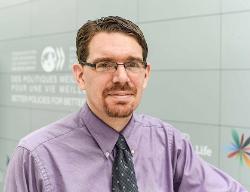
William C. Smith recently accepted a position as the Senior Project Officer for Research with UNESCO’s Global Education Monitoring (GEM) Report team where he will be responsible for the development of the thematic section of the 2017 Report on Accountability in Education. William’s research focuses on education’s role in economic and social development with special interests in national testing policies, educator based accountability, population health, and equity in educational inputs and outcomes. Prior to joining the GEM Report team William helped develop and pilot the Right the Education Index as a Senior Associate at RESULTS Educational Fund, was a Thomas J. Alexander Fellow at the Organization for Economic Co-operation and Development (OECD), and spent six years teaching secondary social studies. William holds a dual-title Ph.D. in Education Theory & Policy and Comparative International Education from the Pennsylvania State University, a Masters degree in International Development from the University of Denver, a Masters degree in Teaching from Western Oregon University, and a Bachelors degree in Sociology from Portland State University. His research has resulted in over 20 academic and policy publications, including his recently published edited volume The Global Testing Culture: Shaping Education Policy, Perceptions, and Practice.
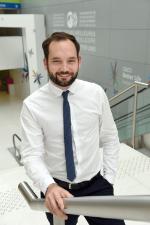
Nicholas Spaull is a Senior Researcher at Stellenbosch University (South Africa) and Johannesburg, where he is also Co-principal investigator for the “Building evidence for policy making” project funded by the Zenex Foundation 2015 and project manager for a large research project for the South African Presidency funded by the European Union under the Programme to Support Pro-Poor Policy Development II (PSPPD 2). Nicholas sits on the Joint Advisory Committee of the South African Human Rights Commission. He has recently been awarded an ESRC/DFID grant to research exceptional township and rural schools in South Africa.
He has been involved in a number of research projects for local and international organisations including the South African Presidency, the Department of Basic Education, UNICEF, the EU, UNESCO and SACMEQ.
Nicholas earned his PhD in economics and was a visiting scholar at Stanford University. He regularly updates his website (www.nicspaull.com) with new research and articles he finds interesting.
Fellowship results:
Spaull's fellowship project aimed to identify the binding constraints to quality education for the poor in South Africa. It addressed the question: How does one combine access and quality in education to provide contextual profiles for countires. His research will focus on eight developing countries that participate in PISA: Brazil, Colombia, Costa Rica, Indonesia, Mexico, Peru, Thailand and Turkey - and aims to combine measures of access and quality. By using PISA data in conjunction with household survey data for each country, the project created a composite statistic of access-to-learning which covers both the in-school and out-of-school population of 15 year olds.
Rodrigo Torres received his PhD in Economics of Education at the UCL Institute of Education, University College London. He was working as an External Consultant at the Faculty of Education, University of Cambridge, in a research project on equity in education for the UNESCO Institute for Statistics. He was also a Research Fellow at the College for Interdisciplinary Educational Research in Germany. His main research interests are educational inequality and education policy in primary and secondary education. His work focused on studying the determinants of educational inequality in Chile, the UK and other OECD countries. During his Doctoral research, he studied the association between teacher quality and inequality in educational achievement in Chilean schools, as well as the importance of secondary school quality in explaining access to higher education for disadvantaged students in Chile. He also developed a cross-national study addressing the association between institutional policies and academic achievement using PISA data. Before starting his PhD, he worked in Chile at the Ministry of Education as a Technical Advisor to the Minister of Education and at the National Council of Education, mainly developing applied research on the Chilean Higher Education system. He holds a BSc in Engineering from the Catholic University of Chile.
Fellowship results:
School accountability is increasingly prevalent around the world. A recent study on PISA shows that an important number of countries report student academic results and make use of standardized assessments. The basic rationale behind school accountability is that schools and teachers who are more accountable to their communities and central governments will use the available information on educational outcomes to focus their efforts on improving all students’ academic achievement. However, evidence about the effect of different accountability procedures on equity in education and average educational achievement is mixed and limited, and usually comes from country case studies. There are very few cross-national studies evaluating the effects of accountability practices on educational outcomes. At the same time, most cross-national comparisons use cross-sectional data for their estimates, where it is difficult to isolate school accountability from other institutional characteristics affecting educational outcomes. Also, the relationship between schools’ accountability practices and other institutional policies affecting academic outcomes remains unclear.
By producing a panel dataset using data available for several PISA waves and exploiting variation in institutional policies and school practices within countries over time, this study aims to estimate the impact of school accountability practices on average educational achievement and equity in education for developed and emerging countries. The study will also explore whether the two types of accountability practices previously defined by the OECD (for benchmarking and information purposes, and for decision making at schools) differ on their impact on average results and equity in outcomes, while estimating whether there is an improved effect of school accountability on equity depending on schools’ autonomy at decision making, school selection policies and school competition levels.
The results of this study aim to provide evidence to inform policy makers about which accountability practices actually improve educational outcomes and how accountability policies could be better tailored and complemented with other school practices and institutional policies to guarantee that education systems are more equitable and all children have access to better education.

Antonio Villar is a researcher in the field of welfare economics, dealing both with theoretical and applied aspects (distribution rules, welfare comparisons, income distribution, human development, equality of opportunity, education, design of social indicators). He holds a Doctorate in Economics from the University of Oxford and is full Professor at the Pablo de Olavide University (Seville) and Senior Researcher at the Instituto Valenciano de Investigaciones Económicas (Ivie). In 2010 he received the Andalusia Research Prize in Social Sciences and Humanities.
He has published fourteen books and some 80 research papers. He also has a long involvement in the Spanish system of science and technology, mostly dealing with the evaluation of research proposals.
He has been Visiting Professor at Stanford University, the European University Institute (Florence), the Institute for Advanced Studies (Vienna) and the University of Oxford, among other places.
Personal website.
Fellowship results:
How Bad Is Being Poor For Educational Performance? A Message from PISA 2012
Educational Poverty as a Welfare Loss: Low Performance in the OECD According to PISA 2012
Lectures on Inequality, Poverty and Welfare
Fracaso en la education obligatoria: rendimiento e igualdad de oportunidades
How far from the tree does the leaf fall? - OECD Education and Skills blog
El problema de la equidad en la educacion basica

Megan Welsh is a current TJA scholar and holds a doctorage in Education Psychology from the University of Arizona. Megan's background is in research on topics related to the development of new assessments, such as performance-based assessments, evidence-centered design, assessment validation, and learning analytics.
Related Documents

